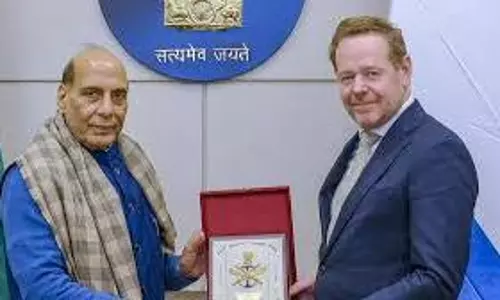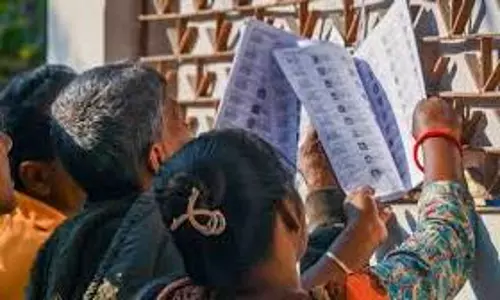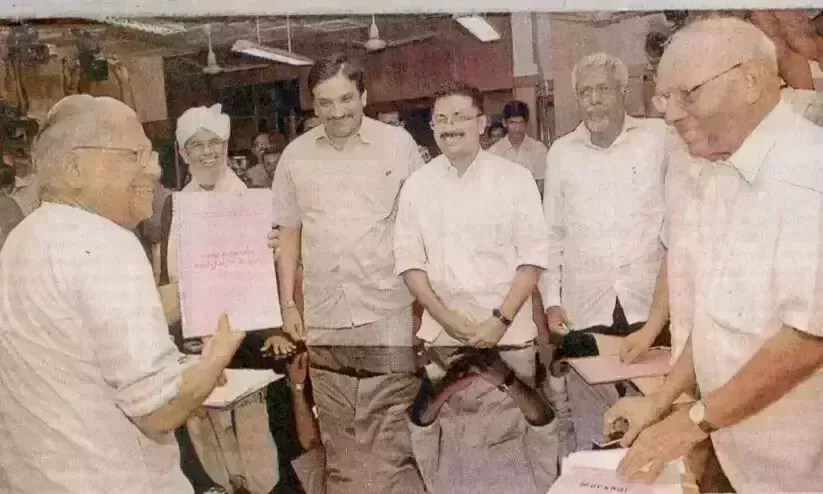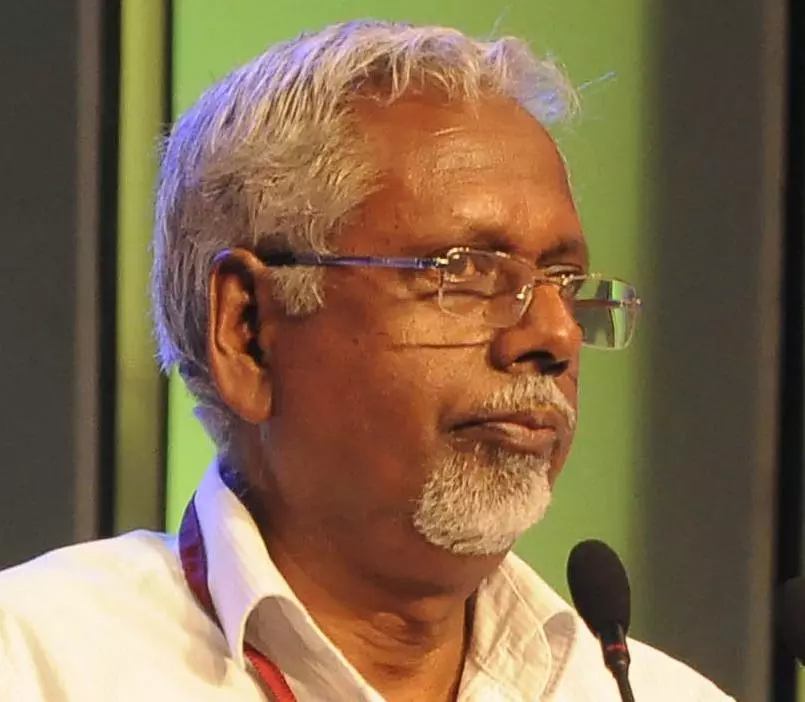
Muslim scholarship controversy: A result of vote bank politics
text_fieldsThe recent judgement of the Kerala High Court, quashing the three state government orders released on August 16 2008, February 16 2011, and May 8 2015, meant to provide scholarships to minorities, have as much given rise to widespread debates, as they have raised other issues impinging on the state giving benefits to different minorities.
As per the 2008 order, Muslim girls doing a degree, post-graduate and professional courses were granted Rs 3000, Rs 4000, Rs 5000 respectively as scholarship per year based on merit. The subsequent order of 2011 extended it to other backward communities too, by giving 20 per cent of the scholarship allocation for Latin Catholics and other converted Christian communities. And the 2015 order allowed scholarship for students of CA, Cost and Works Accounting, Company Secretaryship etc., with an annual income below Rs six lakhs.
While political parties such as the Muslim League, the Indian National League (INL) and the People's Democratic Party (PDP), as well as Muslim religious and cultural organisations of Kerala in general, have demanded a getting a revision of the court ruling or filing an appeal against it, some Christian organisations have welcomed it. As for the government of Kerala, the chief minister said that it would state its stand after going through the judgement in detail.
As of now, viewing the facts from the right perspective is essential to avoid unnecessary controversies and possible frictions that may follow.
Preface of Paloli Committee report
On February 21, 2008, a committee appointed to study Sachar Commission Report in Kerala, headed by the then Local Self Governance Minister Paloli Mohammed Kutty, submitted its report to the then chief minister V S Achuthanandan. The preface of their report read:
"On 9th March 2005, the Government of India had engaged a seven-member committee under the leadership of Justice Rajinder Sachar for submitting a Report to the Central Government on the Muslim Community in India by collecting the statistics and the status in the educational-social and economic sectors by objective analysis. The Central Government have undertaken such a mission as part of an attempt to find out the infirmities suffered by the Muslim community in this field and to find out solutions to these infirmities through creative intervention. As a result of an intensive effort for a period of almost one and a half years, a detailed and comprehensive report prepared by the High-Level Committee under the leadership of Justice Sachar was placed before the parliament on 30th November 2006. The Sachar Report has recorded that the Muslim appeasement is a coloured myth and that they are becoming the most backward community in the developmental path. In the light of the Sachar Committee Report, most of the national political movements have demanded to take steps for the redressal of Muslim backwardness. In this matter, the Left Democratic Front Government in Kerala have initiated exemplary steps. For submitting suggestions regarding the implementation of the Sachar Committee Report in Kerala, as per an order issued on 15th October 2007, the Government of Kerala has engaged a Committee with Shri Paloli Mohammed Kutty (Minister for Local Self Government) as Chairman and the following persons as members: Shri. T.K.Hamza(M.P), Shri K.E. Ismail(M.P), Shri A.A.Azeez(M.L.A), Dr.K.T.Jaleel.(M.L.A),Shri.T.K.Wilson, Dr Fazal Gafoor, Shri.O.Abdurahman, Dr Hussain Randathani, Shri C. Ahammed Kunhu, Shri.Kadakkal Abdul Azeez Moulavi".
The Paloli Committee was appointed for the implementation of the Sachar Committee report, which was concerned with Muslims in the state, but not minorities as a whole. That was made clear in the first sitting itself of the Paloli Committee.
Muslims in Kerala
Under the title "Kerala Muslims", the Paloli Committee report said, " Even though the Muslim backwardness in Kerala is different from that of other States in India, in details and circumstances, the Sachar committee has found in various sectors that it is a gazing reality on social justice. Even though Kerala stands apart from other States on account of political awareness, the progressive character inherited by renaissance movements, the availability of infrastructure facilities and the common advancement achieved in the health-education sectors by the Keralites, the reality is that the Muslims in Kerala stand far behind than the other Communities in the social, economic and educational fields. The standard of education of a community is one of the prime criteria for its status in society. The mode of acquisition of education and skill among the various social categories in Kerala indicates the progress among all the categories. There is a substantial increase in the percentage of literacy. The differences prevailed in the general literacy rate has been decreased gradually. But still there exist differences in the level of acquisition of education. The standard of education of the Keralite Muslims stands too low to that of Christians and the castes those stood in the prime position in the traditional caste series."
Though the situation of Muslims in Kerala is much better than in other states, they lag behind Hindus and Christians in education and employment. According to the 2001 census, the Muslim population in Kerala is 24.70 per cent, but those who have collegiate education is 8.1 per cent, while Hindus have 18.7 per cent and Christians at 20.5 per cent. In the case of poverty, Muslims were at 28.7 while Christians were at 4 per cent, which bears out that both the minorities are far from equal.
Suggestions put forward by the Paloli Committee:
"The role of scholarship in promoting education is important. Scholarship help in improving the standard of education. In addition to that, it can be utilized to advance the study programmes to those who are in financial stringency. Such kind of scholarships will be more useful to the majority of Muslim students who are in a backward condition. In Kerala to promote the education of Muslim girls there have been existing for many years the yearly scholarship up to the tenth standard," part VI, page 27 of Paloli Committee Report.
The report suggested that new educational scholarships should be introduced for Muslim girls and all of those who deserve fee benefits. Among Muslim girls, the annual scholarships were Rs 12,000 for students of research-oriented courses and Rs 2000 for both degree and postgraduate students of arts and science.
Due to lack of necessary training and personality development, the representation of Muslims in senior positions in government service, public sector institutions and banking is far below. As a solution for this, the Paloli report suggested special coaching centres for the Muslim community, which the state government implemented. Later, the government also allowed other backward minorities to these establishments but not as a matter of their right.
What is happening now?
Coming back to the recent court ruling, the question is will Latin Catholics and converted Christians in the Christian community add up to more than 20 per cent of minorities? Or does the whole Christian community, as a minority section, deserve scholarships? If yes, then shouldn't all the students of forwarding communities be eligible for the scholarship and all the students in the Muslim community too?
The preface of the Paloli Committee report states that out of 398 petitions received at sittings held in 14 districts, 77 issues were considered in general. That list includes representations from Kerala Yuktivadi Sangham, Kerala Vishwakarma Sabha, Padmashali Samajam and Kodalnadakadvu NSS Karayogam, but from no Christian organisations. Out of the 11 members of the Paloli Committee, only one was a Christian, but he never raised anything for his community in any of the sittings. All this shows that the plan was for the uplift of Muslims alone and not of minorities in general. But now, after years, the misinterpretation of the three mentioned orders as discrimination against Christians is a figment of the minds with narrow interests.
The BJP and Sangh Parivar, who were against the Sachar report, are backing it now. The particular sympathy they show towards Christians, who were bracketed in their list of nation's enemies with Muslims and Communists as in their ideologue's book as "disloyal to the nation", is curious.
The state government made a mistake when they termed Paloli Report recommendations as benefits for minorities instead of Muslims alone. The second lapse was due to the government counsels' glaring failure to present before the court the factual background regarding the three orders. The government should do whatever is needed to get the court ruling amended so that justice is served. Otherwise, discontent and grievance will continue to grow and spread among people.























